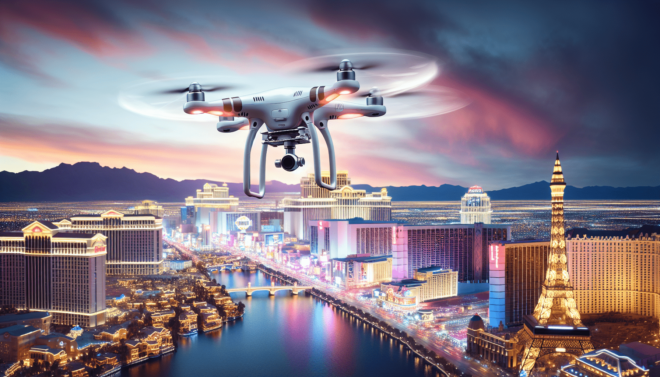Have you ever wondered about the specific drone laws in Nevada that apply to Las Vegas? In today’s rapidly evolving world of technology, drones have become remarkably popular for both recreational and professional use. Whether you’re a resident of Las Vegas or planning to visit, it’s crucial to understand the regulations governing drone operations so you can stay legal and enjoy your flying experience without any issues.
Understanding Drone Laws in the United States
The Federal Aviation Administration (FAA) oversees drone laws in the United States. While federal regulations provide a baseline, individual states and even cities can impose additional rules. This dual system of governance can complicate matters, particularly in bustling urban areas like Las Vegas.
Federal Drone Regulations
Before diving into Nevada and Las Vegas-specific laws, it’s helpful to know the overarching federal regulations. The FAA’s rules largely focus on safety and don’t exclude the possibility of more stringent local laws. Some key FAA regulations include:
- Registration: Drones weighing over 0.55 pounds must be registered with the FAA.
- Altitude Restrictions: You cannot fly higher than 400 feet.
- Line of Sight: Always keep your drone within your visual line of sight.
- Airspace Restrictions: Drones are forbidden in certain airspaces including near airports.
These federal guidelines form the cornerstone upon which state and local laws are built.
Nevada’s Drone Laws
Nevada has its own set of regulations to supplement federal guidelines. These laws mainly focus on privacy, safety, and the responsible use of drones in various environments.
State-Level Regulations
Nevada’s drone laws aim to address local concerns that the FAA may not specifically cover. Here are some notable state-level regulations:
- Privacy: You are prohibited from using drones to capture images or videos of people where there is a reasonable expectation of privacy without their consent.
- Near Infrastructure: Drones cannot be flown near critical infrastructure like power plants and government buildings.
- Wildfire Restrictions: Flying drones near active wildfires is illegal as it can interfere with emergency response operations.
Specific Rules for Government and Commercial Operators
Commercial drone operators and government agencies may have additional regulations:
- Commercial Use: Operators must have a Remote Pilot Certificate as per Part 107 of the FAA regulations.
- Government Use: Government agencies may require specific permissions for certain types of surveillance and operational activities.
Local Drone Laws in Las Vegas
While state laws encompass broad regulations, Las Vegas has its set of additional rules aimed at addressing urban-specific challenges and needs.
Special Considerations in Las Vegas
Las Vegas is a dense and bustling city with unique features that necessitate particular rules:
- Strip Restrictions: Flying drones over the Las Vegas Strip is heavily regulated due to the high density of people and potential hazards. Specific permissions are required.
- Event Restrictions: Public and private events, especially in crowded venues, have particular restrictions to ensure public safety.
- Drone Parks: Although restrictions are more stringent in urban areas, designated parks and open spaces are available for recreational flying.
Coordination with Local Authorities
Given the localized nature of these rules, always coordinate with local authorities such as the police and city administration to ensure compliance:
- Permits and Permissions: Obtain necessary permits for commercial activities or for particular restricted zones.
- Reporting Issues: In case of any incidents or unforeseen circumstances, promptly report to the local authorities.
Practical Tips for Drone Enthusiasts
To navigate these multi-layered regulations effectively and enjoy your flying experience, consider the following practical tips:
Check and Register
- FAA Registration: Ensure your drone is registered with the FAA if it meets the weight criteria.
- Local Permits: Check if you need any special permits for specific activities in Las Vegas.
| Requirement | Action Needed |
|---|---|
| FAA Registration | Register online if drone > 0.55 pounds |
| Local Permits | Contact local authorities for specific permits |
| Remote Pilot Certificate | Obtain for commercial use |
Pre-Flight Preparations
- Location Research: Identify and research the area where you plan to fly.
- Weather Conditions: Always consider weather conditions that can affect drone operations.
- No-Fly Zones: Double-check for any temporary or permanent no-fly zones using apps or official resources.
Respect Privacy and Property
- Ethical Flying: Don’t capture images or videos without consent.
- Avoid Sensitive Areas: Stay away from critical infrastructure and private properties unless permitted.
Safety First
- Emergency Protocols: Know what to do in case of emergencies like a drone crash or loss of signal.
- Equipment Check: Regularly check your drone’s condition and functionality before flying.
Seeking Special Permissions
Certain scenarios may necessitate acquiring special permissions, particularly in restricted areas like the Las Vegas Strip or during special events. Here’s how you can approach this:
Contacting Relevant Authorities
Identify the authority responsible for the restricted area. Usually, this includes:
- City Administration: For general spaces within the city.
- Private Event Organizers: For events on private property.
- Other Agencies: Specific government bodies for critical infrastructures or other sensitive locations.
Application Process
Once you know whom to contact, follow these steps:
- Submit Request: Send a detailed request outlining your drone’s purpose, flight plan, and equipment details.
- Wait for Approval: Await confirmation or further instructions.
- Follow Guidelines: Adhere to any specific conditions or guidelines provided.
Common Legal Issues and How to Avoid Them
Despite your best efforts, legal issues can arise. Knowing common pitfalls can help you avoid unnecessary trouble.
Illegal Surveillance Concerns
Unauthorized surveillance using drones has legal consequences. To avoid such issues:
- Clarify Intent: When in suspicious situations, clarify your intentions to anyone concerned.
- Safe Distances: Maintain a reasonable distance from private properties unless you have explicit permission.
Unauthorized Flying in Restricted Zones
Unauthorized flying in sensitive zones like the Strip or during high-profile events can bring stiff penalties:
- Up-to-Date Info: Always have the latest information about restricted zones.
- Contingency Plans: Have alternative locations in mind to prevent last-minute issues.
Invasion of Privacy
Privacy concerns are significant, particularly in residential areas. Respecting people’s privacy helps:
- Ethical Etiquette: Always fly responsibly and ethically, avoiding areas where people expect privacy.
- Seek Consent: Obtain consent if your flight might infringe on someone’s privacy.
Resources for Drone Operators
Staying informed and continually updating your knowledge base ensures you remain compliant and safe. Here are some valuable resources:
Official Websites and Apps
Leverage official resources that provide real-time updates and guidelines:
- FAA Website: Offers comprehensive federal guidelines and updates.
- Local Government Websites: Provide detailed information about state and city-specific laws.
Drone Community Forums
Join discussions in drone community forums to share experiences, tips, and advice:
| Forum/Community | Features |
|---|---|
| DJI Forum | Discussion on DJI products, tips, and updates |
| Mavic Pilots Community | Community discussions and advice |
| Local Meetups | Networking and local law updates |
Training and Certification Courses
Enrolling in training courses can also help you stay abreast of changing regulations and enhance your drone operations skills:
- Part 107 Training: For commercial operators to prepare for the Remote Pilot Certificate.
- Workshops and Webinars: Often provided by industry experts and local authorities.
Future of Drone Regulations
The landscape of drone regulations is continually evolving. The increasing prevalence of drones is prompting legislative bodies to revisit and refine existing laws continually.
Upcoming Federal Laws
The FAA is continuously developing new frameworks to manage emerging technologies like drone delivery services. Staying attuned to these changes ensures you’re compliant with both existing and upcoming regulations.
State and Local Future Trends
Nevada and Las Vegas might also see more sophisticated rules tailored to mitigate evolving challenges:
- Dynamic No-Fly Zones: As urban environments change, new zones might be designated for various safety and privacy concerns.
- More Engagements: Increasing collaboration between government bodies and drone operators to develop balanced regulations.
Conclusion
Navigating the complex terrain of drone laws in Las Vegas involves understanding federal, state, and local regulations. While the overarching federal guidelines provide a foundation, specific local rules in Las Vegas address unique urban challenges. Staying well-informed and respecting privacy and safety measures ensures your drone operations remain enjoyable and legal.
By taking the time to comprehend and adhere to these layered regulations, you can focus on the thrill and potential that modern drone technology offers, all while flying responsibly and safely. Don’t forget to regularly consult trusted resources and maintain open channels of communication with local authorities to stay updated on any regulatory changes. This way, you can seamlessly integrate your drone activities within the vibrant and dynamic landscape of Las Vegas, ensuring a rewarding experience every flight.

